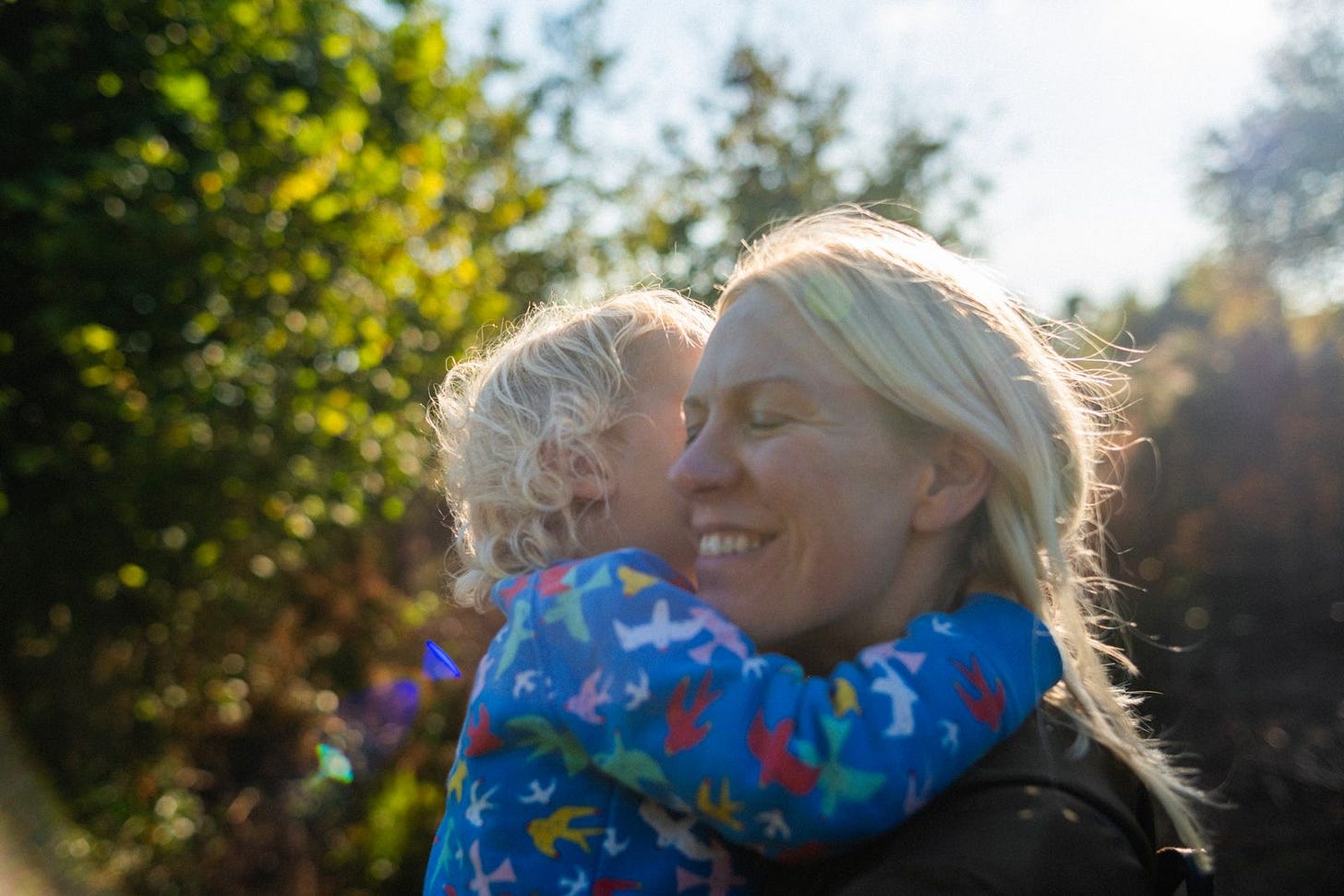Sobriety, Self-Care & Compassionate Parenting
“My sobriety, how I take care of myself, and how I parent my son are all interlinked, and they all share the same foundations.”
Want to hear Ellie read this essay? Hit play here:
On a warm summer’s day in 2017, I was walking along a quiet stretch of the River Thames with a group of friends. I was holding the hand of my friend’s three-year-old son. I remember how trusting he was, chatting away to me as we walked along. And I remember I’d had too many ciders. I remember the dizziness in my head and my racing heart as I tried to walk carefully and keep him away from the water’s edge. I was acutely aware that, clouded by booze, I didn’t feel that I could safely look after this little boy.
I made a promise to myself that day: I will quit alcohol completely before I have a child.
The shock of motherhood
I’ve been free from alcohol for almost five years now, thanks to discovering This Naked Mind in 2018. My journey to quitting alcohol took 20 months of deep inner work and unraveling old beliefs.
By the time I discovered I was pregnant in March 2020, I was completely free of the desire to drink. This is something for which I am beyond grateful, especially since, like most people, I was entirely unprepared for what lay ahead in the early years of motherhood.
Nothing could have prepared me for the effects of two and a half years of my son, River, waking me every one to two hours. I chose to co-sleep and breastfeed him throughout the night. I’m glad I did it, but it came at a huge cost to my well-being. I was bone-tired, couldn’t think clearly, and was filled with self-doubt and blame. Every day, I woke up feeling angry, especially when I had to care for River all day, alone, while enduring almost intolerable exhaustion.
Navigating this alongside the many seismic shifts of matrescence, my husband’s mental health struggles, and moving out of London was incredibly stressful. I’m so grateful that I was—and continue to be—completely solid in my sobriety. Even in the depths of despair, I never reached for alcohol. Instead, I chose truly loving actions to take care of myself.
True self-care
Not having the option to drink and temporarily numb out means I always have to be with my feelings and take care of myself in a loving way. This is both very hard, and the most incredible gift.
The ways I’ve taken care of myself have changed over the four years I’ve been a mother. However, some constants include connecting with other mothers who are open to deep, honest conversations; attending women’s circles, which I find humbling and a chance to connect with others, recognizing our shared humanity; practicing mindful self-compassion and Focusing; and using The Work by Byron Katie to question my thoughts and beliefs. I also practice yoga nidra and meditation, swim, and spend as much time in nature as possible.
Internalized capitalism
My journey to sobriety led me to completely re-examine the beliefs I was carrying. It meant separating those that belonged to my parents, teachers, and our wider culture from the beliefs and values that were actually mine and that I wanted to live by.
It wasn’t until becoming a mother that I realized how much I had internalized my culture’s messages that caring for children is not valuable. That motherhood should only be a blip, a brief “break” in my career, and that the most important thing was to get back to paid work as soon as possible to earn my sense of worth in the world. And yet mothering has been the hardest, most intense, and probably most important work I’ve ever done.
I’m continuing to learn about how capitalism and the systems it supports affect our daily lives. How it affects how we perceive motherhood and demands us to cope with constant exhaustion and overwhelm. And how the regular use of alcohol fits very neatly into that model.
We’re encouraged to briefly “escape” the stresses of overworking, juggling parenting with paid work, and dealing with oppression, isolation, and much more—by drinking a carcinogenic poison. One that may provide temporary relief in the moment but increases our stress and anxiety over time while causing immense physical harm to our bodies.
I see sobriety as one of the most radical acts of self-compassion and self-care we can practice in a culture that pressures us to endure chronic stress in service of capitalism.
The choice to parent with compassion
In questioning our culture’s prevalent beliefs, and checking in with my own experience, I also looked at how I wanted to show up as a mother. I knew I didn’t want to parent using punishment, fear, and dismissal of feelings. I didn’t want my son to grow up feeling consumed by shame and self-hatred, as I had.
I read about attachment parenting and gentle, respectful parenting, and so much of what I read deeply resonated with me. I realized that I hadn’t been weak or defective as a child for having emotional needs. And that being compassionate to our children and meeting their needs for comfort and connection is the answer to raising emotionally healthy adults.
Most of us didn’t have a blueprint of this growing up, so it can be really hard to give our children what we didn’t receive when we were kids. I’ve learned that it’s okay to do this imperfectly or, should I say, humanly.
I am not a perpetually calm person—quite the opposite. I can easily become overwhelmed and dysregulated. But when there is a rupture in our relationship, like when I’ve yelled at River, I do what I need to take care of myself. This sometimes looks like going upstairs and releasing my anger by punching a pillow a few times. Then, when I feel calm, I come back down, hug him, and I say I’m sorry. We find our way back to the deep love that connects us.
I want my relationship with my son to be about understanding, connection, and trust rather than obedience, correction, and fear. I believe that comforting my son is one of the most important things I can do. For me, this looks like allowing him to feel his feelings rather than try to change them. This could mean allowing him to cry in my arms as I hold him close, without trying to stop his tears. Or it could mean helping him to safely express his anger and anxiety with physical play instead of throwing hard plastic cars!
The basis of all this is knowing that emotions and their expression are neither bad nor wrong, nor something to be corrected in a child. By showing River that I love and accept him no matter how he’s feeling, and by helping him allow emotion to move through his body, I hope he will grow up able to accept and be with his feelings. If he can do this, his chances of using a substance or behavior to try and escape them is far, far less likely.
Trusting myself
To parent in this way has taken an unwavering belief in myself and my values. My sobriety, how I take care of myself, and how I parent my son are all interlinked, and they all share the same foundations.
Part of this foundation is everything I’ve learned about addiction, neuroscience, mental health, and children’s development. And the other part is the truth of my own experience. What feels right to me? What is my body telling me? What is my instinct telling me? This is the guiding principle I use in every aspect of my life.
Often, what I read just adds an extra layer of reassurance to what I already know deep inside. I know the difference I feel when I bring myself self-compassion and self-acceptance. I know what it feels like to comfort my child in the night compared to leaving him to cry. I know that, to me, it feels loving to hold him in my arms as he cries rather than try and stop his expression of feelings.
I know I cannot protect my son from all pain. I know I can’t prevent him from struggling with his mental health, or becoming addicted to anything. But I believe I can reduce his chances of using drugs and alcohol to cope, and of falling into the self-hatred and despair I experienced as a young adult.
I feel deep in my heart that the way I care for my son will help cultivate within him a sense of safety, self-trust, and self-acceptance, and be an anchor of love that he will always carry in his heart.
Now you.
We’d love for you to share in the comments:
If you’re a sober parent, how does sobriety influence your capacity to parent with compassion and mindfulness?
What practices or values do you use to take care of yourself, and how do they impact your relationships with others?
Has sobriety prompted you to challenge or re-examine any beliefs prevalent in society or culture?
And if you found this article helpful, please tap the little heart. It lets others know there’s something useful here and will help us grow this community.
Want to be published on Sober.com? If you’re a sober writer, we invite you to contribute! Reach out to hello@danaleighlyons.com for details.






Such a tender, important share, Ellie. I have so much gratitude in my heart for all the sober parents out there.
This whole article is pure gold.
It's such an important contribution to the world of parenting, especially for those who've become sober.